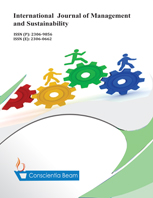An Exploratory Study of Financial Management Practices Among Ghanaian Households
DOI:
https://doi.org/10.18488/journal.11/2014.3.7/11.7.393.414Abstract
This is an exploratory study that investigates the financial management practices of 286 selected households in Greater Accra Regions of Ghana. The main objectives of the study are to examine the budgeting and budgetary control practices of the households and to identify the relationships that exist between the budget culture of a household and their educational level, stage, income, and savings/investment stock. Questionnaire was used in data collection and descriptive statistics such as cross tabulation and Chi-Square test of significance were applied to the data. It was found that most households do not prepare a budget for various reasons. Husband’s dominance of the resource allocation and bargaining process was emphasized by the findings. The study found a significant relationship between household budgeting and level of saving, educational level, income level and age of household. Most households do not seek the assistance of finance experts in financial planning and decision making. We suggest that coordinated measures are put in place by relevant government agencies and finance professionals to boost the level of financial literacy among households and individuals since it has an implication for saving and wealth creation as well as family harmony and unity.

